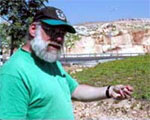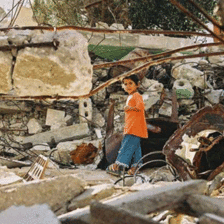The Electronic Intifada 30 March 2003

Jeff Halper
We met with Halper on a rainy afternoon in Jerusalem to discuss him, his activism, and the dismal situation that he has dedicated his energies to resolving. He thinks the notion of mixing activism with academics helps put issues in context in a way that neither would do by itself, and he believes anthropologists are uniquely qualified to work in both areas, specifically because their academic work involves being out in the field and dealing with people. Halper writes voluminously, in clear, accessible, blunt prose with accompanying maps and charts and concrete facts about Israel’s control over Palestinian lives. He is also an activist’s activist, slogging around in the mud trying to prevent the demolition of Palestinian homes by Israeli bulldozers and rebuilding homes that have been destroyed.
With the war in Iraq raging, we begin by talking about the U.S. and its image in the Middle East and move quickly over to Israel and its self-image. Speaking about the U.S., Halper says it has actually not joined the world. It is and has always been isolationist, and Americans are disconnected from everyone else’s reality. This leads to a revealing discussion of Zionism and how it has molded the Israeli people and their thinking. Halper touches on political territory so sensitive that probably only an Israeli could venture in. Zionism, he says, “is a very compelling narrative, but it is totally self-contained, a bubble in which Israelis separate themselves from all others.” Israelis regard everyone else as irrelevant. When it is suggested that fear motivates this self-absorption, Halper disagrees. “It’s not so much fear,” he says; Israelis “just don’t give a damn. They make everyone else a non-issue. They see themselves as the victim, and if you’re the victim, you’re not responsible for anything you do.” Anything goes if you are the victim, he explains: you don’t care about the consequences of your actions for other people, you need not take any responsibility for the effect of your policies on others, you don’t care about how others feel. Israelis always think they’re right, he says. They believe everything they do is right because the Jewish nation is “right,” because they are only responding to what others do to them, only retaliating. “If you combine three elements: the idea that we are right, with the notion that we’re the victim, and with our great military power,” he says, you have a lethal combination. “It’s like being autistic with power. You don’t care about other people because you’ve cast the others as the aggressors. You create a situation where Israel is off the hook.” Israel can act with brutality, but the responsibility, the fault, lies elsewhere.
This mindset plays out in the Palestinian arena, Halper explains, through the widespread Israeli assumption that the only way the Palestinians can achieve anything is “if they accept our way. If they accept what we say, then we can be generous. If they accept their place, we can get along.” Israel sees its response to the intifada as a necessary effort to put the Palestinians in their place. “Why was there so ferocious a reaction to the intifada?” Halper asks rhetorically. It cannot be explained by what the Palestinians did, he says, since in the early days after the intifada began, the Palestinians used no arms and no Israelis were killed, while large numbers of Palestinians were shot to death by Israeli soldiers. But, he says, “they had the chutzpah to call into question our right to have the whole country,” and Israel could not let this stand. “For Israelis, there are not two sides. This is our country,” and Arabs have no rights here. “You’ll notice,” he says, “that Israelis refer to the Palestinians as Arabs, not Palestinians. For Israelis, all Arabs are the same, they’re undifferentiated. If you point out that Palestinians are distinct from other Arabs, they brush it off with a dismissive ‘whatever.’ They say this is our country, there’s a bunch of Arabs here, they should go live with other Arabs.”
Halper tries to be upbeat. He sees the “roadmap” drawn up by the U.S. and its Quartet partners as a promising document because, among a few other straws to grasp at, it actually uses the word “occupation,” which Israel itself refuses to use. He wants to mobilize and coordinate pro-Palestinian groups in Israel/Palestine and elsewhere around the world to insert themselves into the process and try to work with their governments to have some input in implementing the plan. He recently talked to a State Department official who was hopeful. But for the most part, what Halper says is gloomy and pessimistic. Congress is the principal problem in the U.S., he believes, which makes it particularly hard for President Bush. For Bush really to move on the issue, it would “cost him a lot of political capital.” He thinks it’s an open question whether Bush will ever be willing to pay that cost, so he is latching onto the “roadmap.” But then, right after declaring the roadmap a promising document, he says, “Either you just get rid of the occupation, period, or the two-state solution is gone. If Israel keeps the main settlement blocs, it’ll control 90 percent of the West Bank.” But the roadmap shows little promise of “just getting rid of the occupation, period.”
At the end, Halper returns to the issue of Israeli fears and his blunt assessment of where Israel’s actual thinking is centered. “It’s not fear,” he says. “We’re just pissed off [at the Palestinians], the way whites were with blacks in the southern United States. They just don’t know their place.” With such a prevailing Israeli mindset, as well as a U.S. president clearly unwilling to pay the heavy political cost necessary to move Israel, and an Israeli government clearly unwilling ever to relinquish any settlements or any territory, it is exceedingly difficult to share Halper’s tentative sense of hope. But if anyone can make it work, Halper can.
Bill and Kathleen Christison are former CIA analysts who worked for a combined 44 years in the agency before retiring in 1979. Kathleen is the author of the highly recommended Perceptions of Palestine, a definitive overview of US Foreign Policy on the Palestinian issue, and The Wound of Dispossession. Bill and Kathleen live in Santa Fe, New Mexico and are visiting the occupied territories.



